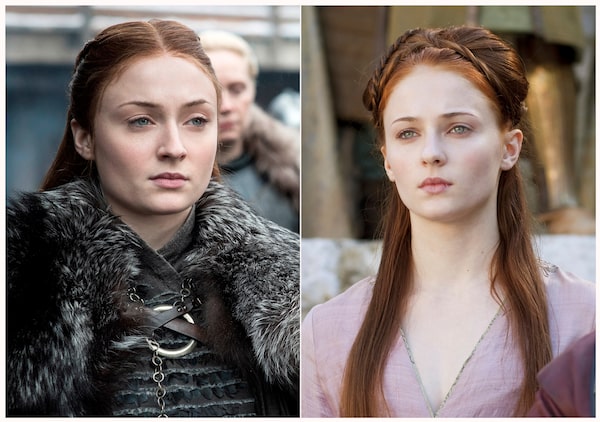This is the weekly Amplify newsletter. If you’re reading this on the web or someone forwarded this e-mail newsletter to you, you can sign up for Amplify and all Globe newsletters here.

Sansa Stark, portrayed by Sophie Turner, emerged as an undeniable winner in Game of Thrones.The Associated Press
There is a lot to mourn if you’re a fan of Game of Thrones. Yes, some of us are grieving the hasty, disappointing ending of the series. Plus, now our screens will have far fewer dragons on them. But for me, I’ll miss the female characters for all of their strengths, complexities and flaws.
I’m Madeleine White, the Assistant National Editor at The Globe, and I’m a nerd. Very specifically, I’m a Game of Thrones (GoT) nerd who has seen all the episodes, read all the books, watched YouTube series dedicated to deconstructing the series and frequented internet fan-theory threads.
Here seems as good as any spot to warn you: THERE ARE SPOILERS AHEAD.
Since the series has wrapped, I’ve been reading a lot of hot takes, including a New York Times Q&A with Sophie Turner, who plays Sansa Stark. Sansa – seriously, here come the spoilers – survives in the HBO series. After seasons of watching a naive teen in love with the idea of being a princess be insulted, raped and manipulated, Sansa emerged as an undeniable winner. She not only rules over her home, Winterfell, she also successfully makes it a separate kingdom, elevating her to the Queen of the North.
Sansa’s abuse was the subject of much debate. And in this season, there’s a scene where she seems to credit it with her ascension. However, Turner had a much different take. She told the New York Times: “It was that she was strong in spite of all of the horrific things that she’s gone through, not because of them. She’s had resilience since the very beginning, and despite all of these awful things that happened to her, she’s kept that resilience. Sansa to the core is resilient and brave and strong, and that had nothing to do with her abusers.”
The resiliency of being a woman is woven into almost every female character: be it Arya Stark, who literally goes blind for part of the series, to Brienne of Tarth, who is perpetually faced with sexist ridicule for being a large, strong female knight, to Daenerys (Dany) Targaryen, who is sold off as a child bride in season one. Even villainous Cersei Lannister experiences unending suffering.
“Cersei suffers some of the same traumas that Sansa and Dany do: She has been married off like a piece of chattel; she’s a survivor of domestic violence, marital rape and sexual humiliation by her husband; she is constantly underestimated by men such as her father, Tywin Lannister (Charles Dance), and her son, Joffrey Baratheon (Jack Gleeson), and humiliated by religious moralists such as the High Sparrow (Jonathan Pryce),” writes Alyssa Rosenberg for The Washington Post. “But Cersei’s trauma has made her clever rather than wise; ruthless rather than compassionate; arrogant rather than curious. And instead of avoiding the cruelties committed by the men who followed her as occupants of the Iron Throne, Cersei exceeds them.”
Yes, Cersei’s subjection to sexism leads her down an evil path but she becomes more powerful in spite of it.
In many ways, the brutality that women on the show suffered did what good sci-fi and fantasy writing should always do: reflects a disturbing reality we already face.
Last year, a woman or girl was killed about every two-and-a-half days, according to the first ever report on femicide in Canada. In recent years, society has also awoken to how common sexual assault and harassment are. And we’ve learned that even when we experience sexual assault, often the people meant to protect us don’t even believe us.
Listen, I hear the critics who argue GoT betrayed its female characters. There are a lot of ways in which the TV series let me down: be it the absolutely crappy job they did with the fierce Sand Snakes, or the brutally out-of-character scene in the final season where Brienne is literally crying in her night robe in the snow after Jaime Lannister leaves.
But there’s no denying that the show also portrayed a multitude of ways in which women navigate systems of powers designed for and made by men.
As Kate McQuade argues for the Lily, GoT – unlike many other shows on TV, in my opinion – gave us many different kinds of female heroines battling these systems in their own ways: “We have seen women assert physical, often violent power commonly associated with men: Arya, Brienne, Daenerys. But we’ve also seen women attain power through more traditionally feminine means. Sansa’s reign in the North, for example, isn’t earned through violence. Instead, she carefully cultivates relationships and makes strategic moves.”
The variety of women, their presentations of power and their moral characters is part of what makes the stories of GoT such a compelling narrative and bringing these characters to life on screen is important symbolism.
So with the ending of this epic series, I’m sad to see this loss of resilient fictional women and the talented female actors who played them. This Sunday in the absence of a new Thrones, I will raise a glass to all of the awesome women in GoT from Sansa to Missandei to Meera Reed.
What else we’re reading:
On the subject of fantasy and sci-fi stories, I recently went on a kick of reading sci-fi books by female writers. If you’re new to the genre and unsure of whether it’s your jam, try reading Ursula K. Le Guin’s award-winning The Left Hand of Darkness, a 1969 novel that’s still very relevant today. (Although my favourite novel by Le Guin is The Dispossessed.) A more current sci-fi author worth your time is Ann Leckie. Her debut novel Ancillary Justice is one of the most gripping, fascinating books I’ve read. And lastly, I’d be remiss if I didn’t suggest Madeleine L’Engle. I first read A Wrinkle in Time when I was 12. It hooked me on sci-fi. I re-read it last summer and enjoyed it thoroughly as an adult. If you’ve got a sci-fi suggestion for me, tweet it at me @JournoMaddie.
Inspired by something in this newsletter? If so, we hope you’ll amplify it by passing it on. And if there’s something we should know, or feedback you’d like to share, send us an e-mail at amplify@globeandmail.com.
 Madeleine White
Madeleine White